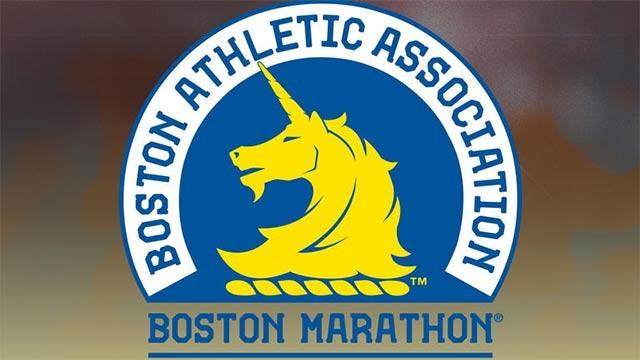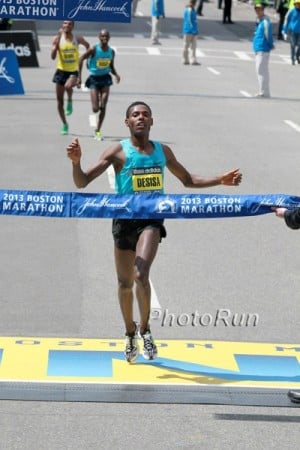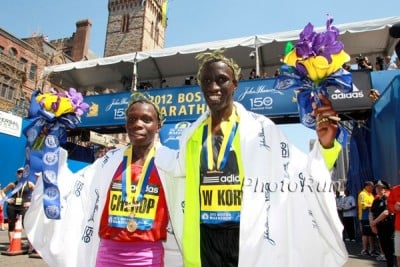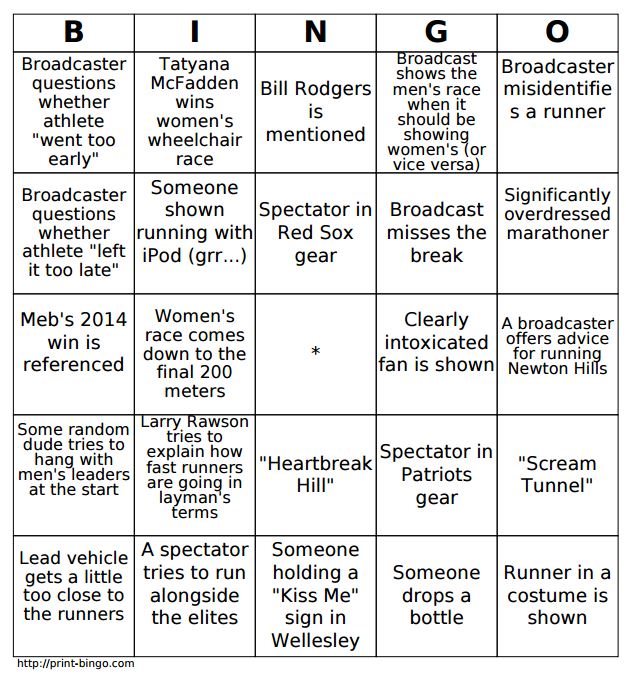The Idiot’s Guide to the 2016 Boston Marathon
By LetsRun.com
April 15, 2016
Note: Every year, we here at LetsRun.com — the internet’s home for distance running and track and field — put together detailed previews of the elite races at the Boston Marathon. This year, in addition to those previews, we’ve put together a “Casual Fan’s Guide” for those who may not follow the sport on a daily basis. So if you’re new to the sport or have simply been out of the loop for a while, read on to find out why you should watch the Boston Marathon on Monday. If you’re an LRC regular, we think you’ll get something out of it and hope you share this article with your non-running friends and family (you have those, right?) so they can appreciate what makes our sport great. And diehards, don’t worry: you can still read our elite previews (men here, women here).
The Boston Marathon is one of the great events in the sport of running. If you’re a frequent visitor to this website, you already know that. But in Massachusetts, “Marathon Monday” is about way more than running. It’s also a state holiday — Patriots’ Day — so kids have the day off school. For the students at Wellesley College, Boston College, Babson College and Boston University, which are right by the course, it’s the biggest drinking day of the year. And the Boston Red Sox traditionally play an 11:05 a.m. home game — the earliest first pitch for a Major League Baseball game all season — so that fans can get out and cheer the masses on afterwards (Fenway Park is just a few hundred meters from the course).
All of which is to say that there are plenty of reasons to be excited about the 120th Boston Marathon, which will be held on Monday. But here at LetsRun.com, we’re always most interested in the running. It’s our belief that running is the best, most elemental sport there is and the Boston Marathon is one of the best showcases of what makes it great: strength, speed, strategy, guts. So whether you’re one of the 500,000 spectators on the course, watching on TV, or running the race itself, we hope that this guide can add to your enjoyment of this special day.
First the basics on how actually to watch the race. The women’s elite race begins at 9:32 a.m. ET (and will end around 11:55), the elite men’s runners and the masses go off at 10:00 a.m. ET (the men’s winner will be around 12:08). The TV coverage in the US is on NBCSN, streamed online at NBCSports.com, and on the NBCSN app and starts at 8:30am eastern. More Tv/Streaming info here.
Race website * 2015 LRC coverage *TV/streaming information
What’s So Special About Boston?
You might be wondering why everybody in the running community gets so excited for the Boston Marathon. Let us help you understand why:
1) It’s old. Really old. The marathon became a thing in 1896, when the organizers of the first modern Olympics decided they wanted some cool new event that hearkened back to Ancient Greece’s glory days. They chose the marathon, a 25-mile race based on the legend of Pheidippides, a Greek warrior who ran 25 miles from Marathon to Athens to report a Greek victory over the Persians before dying immediately. Whether the legend is true or not, a few guys liked the Olympic marathon so much that they decided to bring it back to the U.S. The first Boston Marathon was held the next year, and this year’s edition will be the 120th, making it the oldest annually contested marathon in the world.
2) There’s no easy way in. There are only two ways for the average runner to enter Boston. Either you qualify by running a marathon and hitting a certain time standard or you apply to run as part of a charity, for which you have to raise a minimum of $5,000 (most years roughly 80% of the field hit the time, 20% raise the money). Either way, qualifying for Boston requires a lot of time and effort, which is why people get so excited when they actually make it. The fastest qualifying standard is for the men’s 18-34 age group (3:05:00, or 7:03/mile pace), while the slowest is for the women’s 80+ age group (5:25:00, or 12:24/mile pace). You can see all the 2016 qualifying standards here.
Those are the two main reasons the masses get pumped for it. But there’s a lot more cool stuff about Boston, such as…
3) The course (and unpredictable weather). “Boston Marathon” is a bit of a misnomer as only 2.6 of the 26.2 miles on the course (under 10%) is actually in the city of Boston. Instead, the course follows a northeastern path from the small town of Hopkinton through Ashland, Framingham, Natick, Wellesley, Newton and Brookline before finishing on Boylston Street in Boston’s Back Bay. Along the way, there are several famous portions, including the Scream Tunnel (where the women of Wellesley College cheer loudly and offer kisses to runners), the famed Newton Hills (a series of climbs from 16 to 21 miles) and Kenmore Square, where Red Sox fans congregate after the game to watch the runners.
Because the course is point-to-point and a net downhill (even though the Newton Hills make it tougher than most flat courses), world records cannot officially be set on the course. That was an issue in 2011, when a massive tailwind propelled Kenya’s Geoffrey Mutai to a ridiculous 2:03:02 winning time — which at the time was almost a minute faster than anyone had ever run for a marathon. If you want more about the historically fast 2011 race — which LRC coaching guru John Kellogg predicted — you can read our coverage here and here.
The weather for the race also makes it interesting as weather in Boston in April is totally unpredictable. Sometimes it can be ideal temps (40s or 50s) but the race has also been run in 100-degree weather (1905 – no joke) as well as snow (1967). This year, the weather looks to be ideal for spectators (high 60s) but warm for runners. They might also be running into a headwind so we doubt the times will be fast.
(Editor’s note. We used to have a picture of the course map here but the Boston marathoners have written to tell us their course map is copyrighted and they don’t want it on this website.)
4) No pacemakers. Many big city marathons employ pacemakers, or “rabbits” to ensure fast finishing times. Boston does not, which makes for a far more interesting race. Though it can be exciting to watch athletes chase fast times, pacemakers mean that the first 30 kilometers (18.6 miles, the distance pacemakers run before dropping out) are pretty boring as no one is going to pass the pacemakers and it’s also extremely unlikely an American would be able to stay in the tv screen for more than 15 minutes.
In Boston, the whole race is exciting as runners can make moves much earlier (and Americans almost always stay in the TV screen longer as often the early pace is slow). When Meb Keflezighi became the first American men’s champion in 31 years in 2014, he did it by making a bold move at eight miles to which only one other man responded. The favorites let him grab a huge early lead and he didn’t give it up. For more on that, read perhaps the most-read article in LetsRun.com history: LRC American Strong: The Untold Story of American Teamwork and How Ryan Hall Helped Meb Keflezighi Win Boston.
5) The women’s race is usually close. In six of the last eight years, the winning margin has been four seconds or less in the women’s race.
Who’s Going to Win This Year? And Why Does It Matter?
The short answer: a Kenyan or an Ethiopian. But even if you don’t know anything about running, you probably already knew that — 23 of the last 25 men’s champs and 17 of the past 19 women’s champs have been from those two countries.
But we hate it when someone says, “some Kenyan (or Ethiopian) won Boston.” It may be true, but no one says some Swiss guy won Wimbledon. So let us give you a little insight on the top contenders.
On the men’s side, Ethiopia’s Lelisa Desisa is the favorite. He won the race in 2013, the year of the bombings, and famously gave his winner’s medal back to the city of Boston in a gesture of goodwill. He won again last year, and right now he’s Ethiopia’s best marathoner. The guy races a ton — he ran four marathons last year (most pros only do two, he’s recently said from now on he’ll be doing two as well) — and almost always races well.
If Desisa wins, he should be an obvious pick for the Ethiopian team for this summer’s Olympics. The problem is that no one — not even Desisa himself — knows what he has to do to qualify. Each country can only send three athletes to Rio in the marathon, and in a country with as many strong runners as Ethiopia, the competition for those spots is fierce. Unlike the United States, which relies on a trials race to pick its squad (this year’s was in Los Angeles in February), the Ethiopian Athletics Federation selects its team. However, they aren’t always transparent in how they are going to make their decision. Usually it just picks whoever runs the fastest that year, but considering Desisa and many of Ethiopia’s top men are running Boston (where times are usually slow), that would be a bad approach this year.
We’re assuming the Ethiopian federation won’t be completely stupid and will factor in the Boston’s results to its selection process, which should make Monday’s race super exciting as there are a bunch of other fast Ethiopians running in Boston. Yemane Tsegay, who was the runner-up at last year’s World Championships (where he beat Desisa), finished second to Desisa in Boston last year and will be looking for revenge. Tsegaye Mekonnen and Hayle Lemi Berhanu were total unknowns until they won the Dubai Marathon — the world’s richest marathon, with a $200,000 first place prize — in 2014 and 2015, respectively. Now they’re trying to make their first Olympic teams. There are also a few Kenyans, such as Sammy Kitwara (whose 2:04:28 marathon personal best — 4:45/mile for 26.2 miles — is tops in the field) and Wesley Korir (the 2012 Boston champ) who could win.
The women’s race is largely the same deal. Defending champ Caroline Rotich and rising star Joyce Chepkirui are Kenyan, but most of the other top women are Ethiopians who will be looking to make their cases for Rio. They include Tiki Gelana (the defending Olympic champ who hasn’t been the same since a wheelchair athlete ran her over during the 2013 London Marathon), Buzunesh Deba (who was the runner-up in 2014 behind convicted drug cheat Rita Jeptoo) and Tirfi Tsegaye, who ran a world-leading 2:19:41 (5:20/mile pace) to win the always-competitive Dubai Marathon in January.
What About the Americans? Is That Meb Guy Running? What About Ryan Hall?
Usually Boston attracts many of the top U.S. marathoners but because the U.S. Olympic Trials were held just two months ago, almost every good American marathoner was in that race. Only two American men (Ian Burrell and Girma Mecheso) and two American women (Sarah Crouch and Neely Spence) are listed in the elite fields, and none have any shot of contending for the win. It’s unfortunate for Boston, but it’s a necessary sacrifice. Weakening the U.S. field in Boston every four years in return for one of the most dramatic races in running — the Olympic Marathon Trials — is a more-than-fair tradeoff.
And in case you were wondering about Meb Keflezighi. He’s not in Boston as he finished second at the Olympic Trials and will run in his fourth Olympics in August at the age of 41 — the oldest American Olympic marathoner ever. Ryan Hall, the fastest U.S. marathoner ever (2:04:58 personal best, set in Boston in 2011), retired in January due to fatigue and low testosterone levels.
There’s Been a Lot of Talk About Drugs Recently. Will That Affect This Race?
Maybe. The sport of running has had several drug problems recently and to explain everything would take too long, so we’ll focus on the stuff that could have an impact in Boston, which is…
1) Meldonium. This is the drug that tennis star Maria Sharapova tested positive for at the Australian Open in January. Apparently it was used (and likely abused) by a ton of athletes until the World Anti-Doping Agency (WADA) banned it on January 1, 2016. So far, 172 athletes have tested positive for it in 2016, leading WADA to announce this week that it will offer amnesty to some athletes who tested positive as it’s possible, even likely that many of them used it in 2015 when it was still legal and it just stayed in their system. Sharapova may not be one of the lucky ones to get off totally free as her statements seem give the impression she continued to take it in 2016.
Several Ethiopians have tested positive for it, and Ethiopian-born Abeba Aregawi, one of the world’s best women’s 1500-meter runners, was the biggest track athlete to test positive. She happens to be married to Yemane Tsegay, one of the top men entered at Boston this year. It Tsegay or any of the other Ethiopians running Boston had to stop taking the drug (and so far there is no evidence that they ever took it), they may not run as well on Monday.
2) Kenya. In recent years, a ton of Kenyan athletes have been failing drugs tests, including Rita Jeptoo, who won Boston in 2013 and 2014, the latter in course-record time. Despite those positives, domestic drug testing in Kenya has been a total joke (the tests that caught people were carried out with international funding), and WADA has twice imposed deadlines on Kenya to pass anti-doping reforms, neither of which it has met. WADA gave Kenya a third (and final?) deadline of May 2 and if Kenya doesn’t make any changes by then, it will likely be declared non-compliant with the WADA Code. It’s technically possible Kenya could be banned from track and field from this summer’s Olympics (don’t count on it, trust us that’s not happening). To make sure that doesn’t happen, a man named Wesley Korir has been spearheading an effort to pass anti-doping legislation in the Kenyan parliament. Does that name Wesley Korir sound familiar? He’s the same Wesley Korir mentioned above who we said could win the race. In addition to being a member of the Kenyan parliament, Korir’s a world-class marathoner who won Boston in 2012. In the end, doping will likely be a criminal offense in Kenya. We wish that was true in the U.S. Think about how much money Alex Rodridguez has stolen from other baseball players and how much he’s defrauded baseball fans who thought he was clean.
Are You A Yankees Fan? Do You Hate Boston? Well Then Read This
Ok, ok, ok. We know some of you are having a tough time staying with this piece. Your running-obsessed friend, partner, etc. made you read it. You were doing your best to stay interested but now that we are talking about drugs, you’re struggling to keep your eyes open. Well maybe we can get your attention by saying that as great as Boston is, it’s not even the best marathon run next week – at least in terms of the quality of competition. Six days after Boston – next Sunday – the 2016 Virgin Money London Marathon will be run and every year London has the best field of marathoners. So if you share a cubicle with a smug New Englander who is always talking about how great Patriots’ Day and the marathon is and he or she asks you if you followed the race this year, we suggest you reply, “Not really, I’m really into London this year. With six of the top seven women in the world, it’s just a much more compelling story this year.”
London may be a more compelling race, but nothing beats Boston Marathon Monday. It’s a holiday in New England and for obsessed running fans everywhere.
Boston Marathon Bingo!
If you’re looking for a way to make the TV broadcast more interesting, try playing along with our Boston Marathon bingo card.






